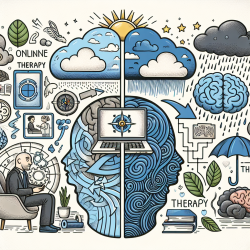The Transformative Power of Media Mental Health Campaigns on Young Minds
As a speech-language pathologist deeply committed to data-driven decisions, I am thrilled to explore the findings of the systematic review titled "A Systematic Review of the Impacts of Media Mental Health Awareness Campaigns on Young People" (Tam et al., 2024). This review provides invaluable insights into the effectiveness of media campaigns aimed at improving mental health outcomes among young people. With the prevalence of mental health issues among youth, it is crucial for practitioners to leverage these findings to enhance their practice and create meaningful change.
Key Findings: Positive Impacts on Attitudes and Behaviors
The review synthesizes data from 18 studies evaluating 15 media campaigns across eight countries. The findings reveal that these campaigns are generally associated with positive changes in attitudes, beliefs, and behaviors among young people. Notably, the campaigns have been successful in reducing stigma, increasing mental health literacy, and promoting help-seeking behaviors.
Key outcomes include:
- Increased Awareness: Campaigns effectively raised awareness about mental health issues and available resources, leading to increased traffic on online mental health platforms.
- Reduced Stigma: Participants reported more positive attitudes towards mental health and reduced stigma towards themselves and others.
- Enhanced Help-Seeking: There was a notable increase in help-seeking behaviors, including primary health visits and hotline calls.
Implications for Practitioners
For practitioners working with young people, these findings underscore the importance of integrating media campaigns into mental health interventions. Here are some practical ways to implement these insights:
- Collaborate with Media Experts: Partner with media professionals to design and disseminate effective mental health campaigns tailored to your target audience.
- Utilize Social Media Platforms: Leverage the reach and cost-effectiveness of social media to promote mental health literacy and reduce stigma.
- Engage Young People: Involve young people in the design and implementation of campaigns to ensure messages resonate and drive engagement.
Encouraging Further Research
While the review highlights the positive impacts of media campaigns, it also identifies gaps in the literature. There is a need for ongoing evaluations to inform best practices in campaign development and distribution. Practitioners are encouraged to contribute to this body of research by conducting rigorous evaluations of media campaigns and sharing their findings with the broader community.
Additionally, exploring qualitative methods and conducting longitudinal studies can provide deeper insights into the long-term effects of media campaigns on young people's mental health.
Conclusion
The systematic review by Tam et al. (2024) demonstrates the potential of media mental health campaigns to positively impact young people's attitudes, beliefs, and behaviors. By integrating these findings into practice, practitioners can enhance their interventions and contribute to the well-being of young minds.
To read the original research paper, please follow this link: A Systematic Review of the Impacts of Media Mental Health Awareness Campaigns on Young People.










